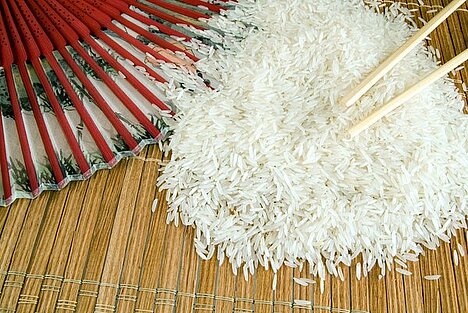Rice syrup

What is rice syrup?
Rice syrup is a liquid sweetener made from cooked and fermented rice. It consists mainly of maltose, a disaccharide consisting of two glucose molecules. Rice syrup has a light brown color and a syrupy consistency. It is often used as an alternative to honey, maple syrup or sugar.
What are the benefits of rice syrup for dogs?
Rice syrup has several benefits for dogs that set it apart from other sweeteners. Firstly, rice syrup has a low glycemic index of around 25, which means that it raises blood sugar levels slowly and therefore less insulin is required. This can be beneficial for dogs with diabetes or who are overweight. On the other hand, rice syrup has a slight taste of its own, which does not mask the taste of the food. This can be helpful for dogs with a sensitive palate or a food allergy.
What are the disadvantages of rice syrup for dogs?
However, rice syrup also has some disadvantages for dogs that you should be aware of. Firstly, rice syrup contains calories, carbohydrates and sugar, which can lead to tooth decay, obesity or digestive problems if fed too often or too much. On the other hand, rice syrup can trigger allergies or intolerances if the dog is sensitive to rice or the enzymes used. This can manifest itself in skin rashes, itching, diarrhea or vomiting.
How can I feed my dog rice syrup?
Rice syrup is not a miracle cure, but a sweetener that should be consumed with caution and responsibility. If you want to feed your dog rice syrup, you should bear a few points in mind:
- Only give your dog small amounts of rice syrup and only occasionally as a treat or reward.
- Pay attention to the quality of the rice syrup and choose an organic rice syrup without additives or preservatives.
- Observe your dog after eating rice syrup for possible signs of hypersensitivity or poisoning.
- Clean your dog's teeth regularly or give him chews for dental hygiene.
Rice syrup is therefore a possible sugar alternative for dogs, which can be fed in small quantities and occasionally. It is non-toxic for dogs, has a low glycemic index and a mild taste. However, rice syrup should not be given too often or too much, as it contains calories, carbohydrates and sugar, which can lead to tooth decay, obesity or digestive problems. You should also be aware of possible allergies or intolerances that rice syrup can trigger. Rice syrup is therefore not a miracle cure, but a sweetener that should be consumed with caution and responsibility.
If you notice any signs of hypersensitivity or poisoning in your dog, you should see your vet immediately. We are not a substitute for a vet, but we try to be as accurate as possible. Every dog reacts differently and we recommend you get a second opinion or consult your vet if in doubt.
Stay healthy and take good care of your four-legged friend!😊